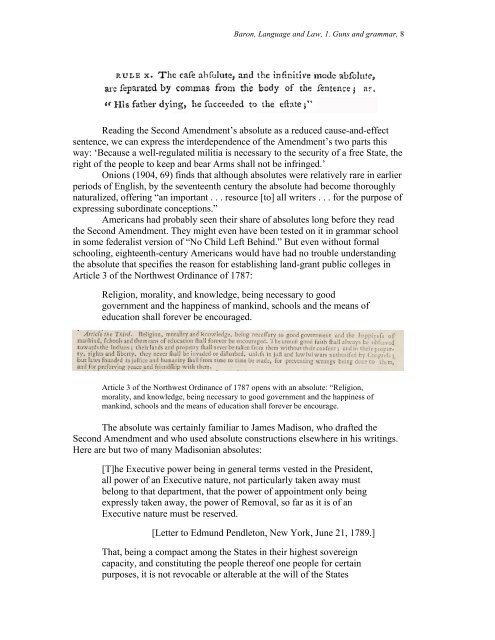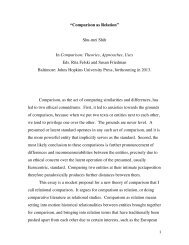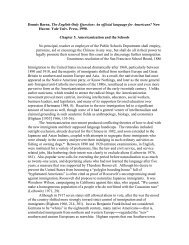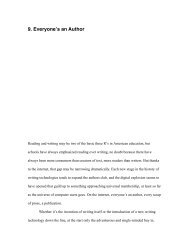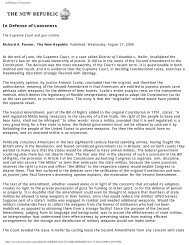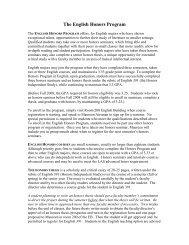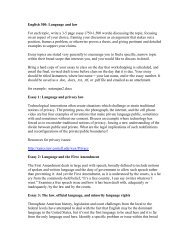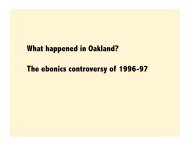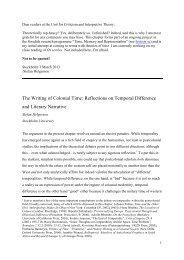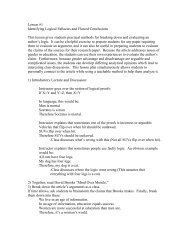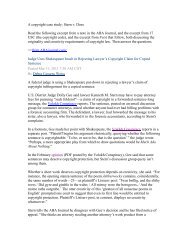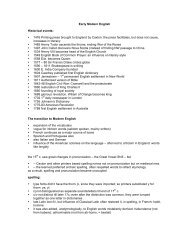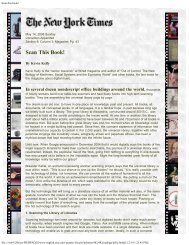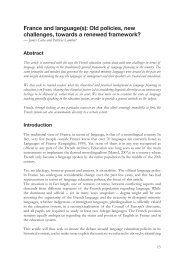Baron, Language <strong>and</strong> Law, <strong>1.</strong> <strong>Guns</strong> <strong>and</strong> grammar, 8Reading <strong>the</strong> <strong>Second</strong> Amendment’s absolute as a reduced cause-<strong>and</strong>-effectsentence, we can express <strong>the</strong> interdependence of <strong>the</strong> Amendment’s two parts thisway: ‘Because a well-regulated militia is necessary to <strong>the</strong> security of a free State, <strong>the</strong>right of <strong>the</strong> people to keep <strong>and</strong> bear Arms shall not be infringed.’Onions (1904, 69) finds that although absolutes were relatively rare in earlierperiods of <strong>English</strong>, by <strong>the</strong> seventeenth century <strong>the</strong> absolute had become thoroughlynaturalized, offering “an important . . . resource [to] all writers . . . for <strong>the</strong> purpose ofexpressing subordinate conceptions.”Americans had probably seen <strong>the</strong>ir share of absolutes long before <strong>the</strong>y read<strong>the</strong> <strong>Second</strong> Amendment. They might even have been tested on it in grammar schoolin some federalist version of “No Child Left Behind.” But even without formalschooling, eighteenth-century Americans would have had no trouble underst<strong>and</strong>ing<strong>the</strong> absolute that specifies <strong>the</strong> reason for establishing l<strong>and</strong>-grant public colleges inArticle 3 of <strong>the</strong> Northwest Ordinance of 1787:Religion, morality, <strong>and</strong> knowledge, being necessary to goodgovernment <strong>and</strong> <strong>the</strong> happiness of mankind, schools <strong>and</strong> <strong>the</strong> means ofeducation shall forever be encouraged.Article 3 of <strong>the</strong> Northwest Ordinance of 1787 opens with an absolute: “Religion,morality, <strong>and</strong> knowledge, being necessary to good government <strong>and</strong> <strong>the</strong> happiness ofmankind, schools <strong>and</strong> <strong>the</strong> means of education shall forever be encourage.The absolute was certainly familiar to James Madison, who drafted <strong>the</strong><strong>Second</strong> Amendment <strong>and</strong> who used absolute constructions elsewhere in his writings.Here are but two of many Madisonian absolutes:[T]he Executive power being in general terms vested in <strong>the</strong> President,all power of an Executive nature, not particularly taken away mustbelong to that department, that <strong>the</strong> power of appointment only beingexpressly taken away, <strong>the</strong> power of Removal, so far as it is of anExecutive nature must be reserved.[Letter to Edmund Pendleton, New York, June 21, 1789.]That, being a compact among <strong>the</strong> States in <strong>the</strong>ir highest sovereigncapacity, <strong>and</strong> constituting <strong>the</strong> people <strong>the</strong>reof one people for certainpurposes, it is not revocable or alterable at <strong>the</strong> will of <strong>the</strong> States
Baron, Language <strong>and</strong> Law, <strong>1.</strong> <strong>Guns</strong> <strong>and</strong> grammar, 9individually, as <strong>the</strong> constitution of a State is revocable & alterable atits individual will.[Letter to M. L. Hurlbert, Mad. Mss., Montpr. May 1830.]Madison would not have used absolutes in his essays, in his correspondence,in <strong>the</strong> <strong>Second</strong> Amendment, if he suspected that his readers might find <strong>the</strong>construction odd, ambiguous, or unimportant.But even if absolutes are not to be isolated from <strong>the</strong> rest of a sentence in formor meaning, Nelson Lund fur<strong>the</strong>r argues that purpose clauses of any kind are legallyirrelevant, that only operative clauses have any effect. Scalia <strong>and</strong> Garner (2012, 217)similarly acknowledge that “a preamble, purpose clause, or recital is a permissibleindicator of meaning,” though <strong>the</strong>y qualify this by adding that such prologues areasides, “not part of <strong>the</strong> congressionally legislated or privately created set of rights<strong>and</strong> duties.” Although <strong>the</strong> Constitution is not “congressionaly legislated,” in hisopinion in Heller Scalia affirms that “a prefatory clause does not limit or exp<strong>and</strong> <strong>the</strong>scope of <strong>the</strong> operative clause” (Heller, 4). But to o<strong>the</strong>r readers, <strong>the</strong> fact that <strong>the</strong><strong>Second</strong> Amendment is <strong>the</strong> only one of <strong>the</strong> first ten with a causal phrase suggests <strong>the</strong>militia clause is important, not just decorative. Eighteenth-century readers wouldhave noticed it, not ignored it. Until Heller, <strong>the</strong> Supreme Court did <strong>the</strong> same. EvenNelson Lund acknowledges as much when he calls <strong>the</strong> <strong>Second</strong> Amendment’sabsolute <strong>the</strong> amendment’s most significant grammatical feature, although he <strong>the</strong>nproceeds to tell us how insignificant it really is (2007, 12).Defining <strong>the</strong> <strong>Second</strong> Amendment’s words Along with questions about <strong>the</strong> <strong>Second</strong> Amendment’s grammatical structure, Hellerraised <strong>the</strong> issue of <strong>what</strong>, exactly, do some of its key words mean:• What did <strong>the</strong> framers mean by a militia?• What does it mean for a militia to be “well-regulated”?• Does <strong>the</strong> phrase “<strong>the</strong> people” refer to individuals or <strong>the</strong> collective polity?• What is <strong>the</strong> meaning of keep in <strong>the</strong> phrase to keep <strong>and</strong> bear arms?• What does bear mean?• What does arms refer to?• What is <strong>the</strong> meaning of bear arms?• Do <strong>the</strong> words ‘to keep arms’ <strong>and</strong> ‘to bear arms’—refer to two separateactivities? Or is keep <strong>and</strong> bear arms to be read as one single phrase?What is a well-‐regulated militia? Interpreters of <strong>the</strong> <strong>Second</strong> Amendment have skirmished over <strong>what</strong> exactly a militiais. Does it refer to an organized <strong>and</strong> trained fighting force, or does it refer to any <strong>and</strong>all individual citizens, from whom <strong>the</strong> militia is drawn? Gun rights advocates,
- Page 1 and 2: 1. Guns and Grammar: Determining wh
- Page 3 and 4: Baron, Language and Law, 1. Guns an
- Page 6 and 7: Baron, Language and Law, 1. Guns an
- Page 10 and 11: Baron, Language and Law, 1. Guns an
- Page 12 and 13: Baron, Language and Law, 1. Guns an
- Page 14 and 15: Baron, Language and Law, 1. Guns an
- Page 16 and 17: Baron, Language and Law, 1. Guns an
- Page 18 and 19: Baron, Language and Law, 1. Guns an
- Page 20 and 21: Baron, Language and Law, 1. Guns an


